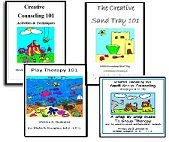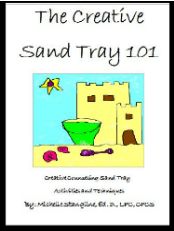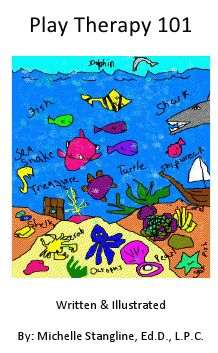Dream Analysis in Sand Tray Therapy Activity

I often have clients come in and want to process a dream with me.
I ask them to recreate the dream in the sand tray. I will then bring out my dream book, or go to the Dream Dictionary online. I process the “hidden meaning” of the dream with the client. This can give great insight to the client and reveal hidden aspects of the psyche.
I believe therapists do not utilize this amazing part of therapy. Clients already have the answers to their problems within themselves. Dream Analysis can help clients answer their problems.
In graduate school there is little time to understand and study dream analysis.
Let the sand tray show you more to your dreams and your clients. It is very helpful for the therapist to use this technique on themselves first.
I always go to the sand tray when I have a bad dream to process the information and build more self awareness within.
Directions:
1. Give a title to your dream. Was it funny, terrifying, or joyful?
2. Explain what the dream was about?
3. Who, or what was in your dream?
4. What five senses were alert in your dream?
5. What feelings came about during or after your dream?
6. Translate the dream in the dream dictionary. How can you relate your dream to the translation?
7.What did you learn about your dream? What was the dream trying to tell you?
8. Build a sand tray or mystery counseling session world based on your dream.
The Great Dreamers of Dream Analysis: You must see this video and it is now on U-Tube. Look for it in parts. It explains how research is showing us more and more about dreams. Science is connecting to dream analysis in therapy!
See the video “Dreams” Nova on U-Tube.
Why is dream analysis important in the counseling session?
We need to look at the masters of psychotherapy for the answers in dream analysis. They knew how important dreams were almost one hundred years ago. Why on earth do therapist today not understand and utilize dream analysis with clients today? Good question!
Sigmund Freud (1856-1939): The father of psychoanalysis and the author of the book The Interpretation of Dreams.
Freud believed that every dream you have is communication from your unconscious mind.
He also believed that civilized society is a type of collective unconscious group mentality.
In his book he talks about the fact that people repress their urges and impulses, but dreams are a way to release these urges and impulses.
Freud broke the mind down into three parts: Id- Primal instinct (lizard brain) wants to meet all primal instincts such as pleasure and not pain.
Ego- Concerned with the conscious mind. It is the moral and rational part of the mind. You will find Self-Awareness located here.
Superego- Controls the Id and ego. When you are awake the superego will control the ego and the id. The superego tries to block your memory of your dreams. Freud believed that the id is the part that will show up in your dreams.
Carl Jung (1875-1960): Jung believed in the collective unconscious (again reptile brain) but refused to view it as sexual.
He believed the unconscious collective was the soul or spirit of the person.
He believed that dreams translated what your unconscious mind was saying and that they often offered solutions for the awake mind, as in the research shown in the Nova Video.
Jung discovered the Archetype and the shadow part showed up in dreams.
Miniature work is a great way to work with the Archetypes. They break these types up into parts. You can project the different parts of yourself onto the miniatures in or out of the sand tray.
From my observations it is very difficult to explain to students or clients for that matter the intensity of the Archetypes in Jung's Theory.
Check out my "Personality Parts" on the link below for an easier way to use Jung's Archetypes in therapy.
Alfred Adler (1870-1937): Adler believed in dreams and the importance of learning from them. He believed dreams show you the answers to your problems. He also believed that if you have a lot of problems you will dream a lot.
Therapists need to be working with clients and their dreams to help people find the answers within.
Frederick Perls (1893-1970): The father of Gestalt therapy believed that dreams are created by the disowned parts of the self. Fritz was into role playing as seen in the "empty chair" technique.
He liked to role play dreams. You can role play your dream in the sand tray. This is similar to the "empty chair" technique. References: Nova Dream Video, Dream Dictionary.com
Dream Analysis to Personality Parts of Self
See Dream Analysis Examples
Dream Analysis to Creative Counseling 101 Home
Disclaimer: This website and its content is intended for trained licensed mental health professionals and school certified mental health professionals to use for their clients / students at their own discretion.
*If you ignore the disclaimer above are using these techniques on yourself and you feel any discomfort or upset it is highly suggested that you seek out a licensed mental health professional immediately.
"Beyond Art Therapy" is the concept from Dr. Stangline that combines all creative fields in therapy. It is not the traditional "art therapy" but goes beyond to include sand tray therapy, play therapy, mindfulness, meditation, color therapy, cognitive behavioral therapy, and a vast majority of other therapies.
For any other type of mental health emergency call your local 911 / Police Number immediately.
Dr. Stangline does not offer advice / suggestions to anyone who is not a professional mental health provider, or a student who is studying this field and has questions about mental health programs of study.
Creative Counseling eBooks for Sale:
Creative Counseling 101 eBook: Our Best Seller!
Learn how to be a more Creative Counselor / Therapist with the book that started it all!
Learn step by step therapy with over fifty-five creative counseling and therapy techniques and activities. Includes full color reproducible worksheets with most activities.
Winner of the Counselor Writer of the Year Award, 2011, Georgia Regional Award, 2012
Download Your Copy Today
Only $39.95
The Creative Counseling 101
eBook
Get ALL FOUR Creative Counseling eBooks for Only $98.95

Get your complete set of the Creative Counseling 101.com eBooks by Dr. Michelle Stangline for only $98.95, that's only $25.00 per eBook (Regular Price is $39.95).
Your complete set includes: Creative Counseling 101 Creative Group Counseling 101 Creative Play Therapy 101 Creative Sand Tray Therapy 101
Order Your Complete eBook Set Today by Clicking The Link Below:
Only $98.95 for all four eBooks
See Complete Set of ALL eBooks For SaleBRAND NEW: Warm and Fuzzy School Counselor Classroom Guidance Lessons eBook
Get a year's worth of school counselor's guidance lessons, character education words, and social stories! Complete with lesson plans and behavior incentives.

Warm & Fuzzy School Counselor Guidance Lessons eBook
The Creative Small Group Counseling 101 eBook
This ebook includes 252 pages of step by step group therapy ideas for school counselors and professional therapists.
Group topics include grief, anger management, friendship, self-esteem, positive behavior, and stress management with colorful, reproducible worksheets.
Download Your Copy Today (See Below Link):
Only $39.95
Creative Small Group Counseling 101 eBook
The Creative Sand Tray Therapy 101 eBook
Learn about the creative sand tray therapy process. This is an exact replica of the graduate sand tray therapy class I teach at a major university in Atlanta. You get 147 pages of creative ways to do sand tray therapy. Also included are colorful, reproducible worksheets for your clients to use and take home.
Buy it today for only $39.95
Sand Tray Therapy eBook Information and Order FormCreative Play Therapy 101 eBook
You can now learn everything I teach to graduate counseling students with this Creative Play Therapy eBook. The eBook has 25 sessions (181 pages) with step by step colored lesson plans and reproducible worksheets. Learn how to use the play therapy doll house, puppets, miniatures, miniature worlds, the sand tray, and more! If you work with children or teens then this book is a must have item for your practice.
Download your Play Therapy 101 eBook today!
eBook Play Therapy Book only $39.99
Bullying Prevention Coping Skill Card Set
Learn how to deal with bullies and mean teasers the emotionally intelligent way! Click the link below for more information:

Bully Prevention Coping Skills Card Set



